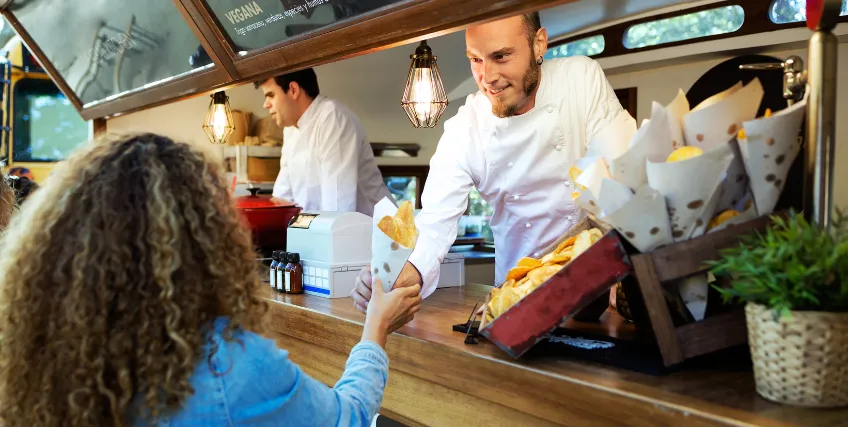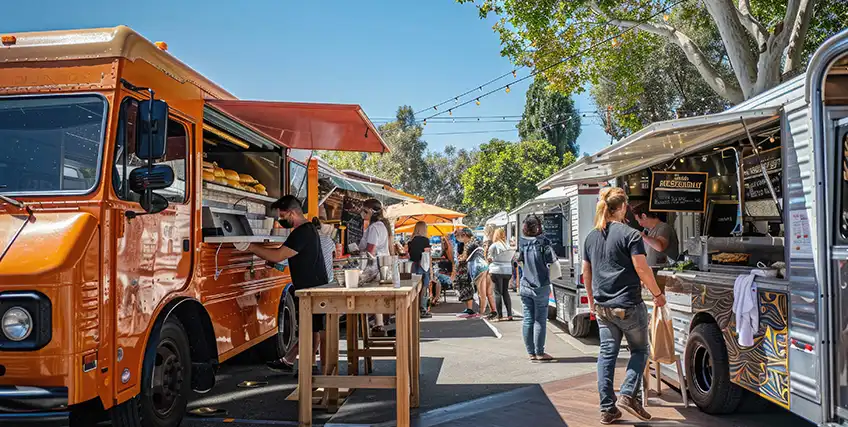Common Mistakes to Avoid When Applying for a Food Truck Loan
November 23, 2025 | Last Updated on: November 23, 2025

Starting a food truck business is exciting. It’s mobile, it’s flexible, and it taps into America’s love for street food. But to get rolling, most entrepreneurs need a food truck loan. Getting funding sounds simple. However, it’s easy to make mistakes that lead to loan denials, higher interest rates, or delays. If you're applying for a business loan for a food truck, it helps to be prepared.
Many small business owners jump in without knowing what lenders actually look for. They might submit incomplete financial statements, ignore their credit score, or apply for the wrong type of loan. This guide breaks down the biggest mistakes borrowers make when applying for a food truck loan. It also gives clear tips to avoid these pitfalls and boost your chances of approval.
Whether you're buying a new food truck, a food trailer, or seeking used food truck financing, this article can help. You’ll understand how to improve your loan application, what documents you need, and how to choose the right loan options for your startup. Avoiding these errors could be the difference between getting funded and getting frustrated. Let’s break it down.
Mistake 1: Skipping a Clear Business Plan
A missing or vague business plan is one of the top reasons a food truck loan is denied.
Lenders want to know where your business is heading. A solid business plan shows how you’ll earn, grow, and repay. Without it, your loan request looks risky.
Your plan should cover:
- Menu and pricing
- Target market
- Daily location or route
- Competitor analysis
- Monthly cash flow projections
- Use of funds
Don’t submit a generic template. Customize it to your food truck industry niche. Show you understand local demand and operating costs. You should include a clear loan amount request and break down how you’ll use it. Will it cover kitchen equipment, permits, or marketing? Spell it out.
A clear business plan also boosts your case for a business loan for a food truck from banks, credit unions, or online lenders. Also, don’t forget to outline your working capital needs. How will you stay afloat in slow months? What’s your strategy for growing revenue?
Mistake 2: Poor Financial Documentation
Missing or messy financials can ruin your loan application.
Lenders want a full picture of your finances. They look at your bank statements, tax returns, and profit and loss statements. If these are incomplete or inconsistent, you’re flagged as high-risk.
Here’s what you need to have ready:
- Last two years of tax returns (personal and business)
- At least six months of bank statements
- Recent balance sheets and income statements
If your startup is new and you don’t have much history, explain your funding sources. Also, show any equipment financing or cash advance you’ve used. Also, include documents for any current small business loans, including monthly payments and remaining balances. Transparency builds trust.
For used food truck financing, you may need truck valuation or sales agreement too. Make sure the paperwork is complete and clear. One missed document can hold up the entire food truck loan process.
Mistake 3: Applying for the Wrong Loan Type
Not all loan options are built for food trucks. Choosing the wrong one can lead to high fees or short repayment windows. Some entrepreneurs apply for personal credit cards or cash advances. These often come with high interest rates and low limits.
A better fit could be:
- Equipment loans for buying trucks or kitchen equipment
- Term loans for long-term growth
- SBA microloans good for smaller loan amounts
- A business line of credit for flexible needs
Also, many search "food truck financing near me" and settle for local banks. But online lenders may offer better funding options.
Match the loan type to your needs Choosing wisely shows you’re a smart borrower. It can lead to lower interest rates and faster approval.
Mistake 4: Ignoring Your Credit Health
Your credit score matters more than you think. It affects your eligibility, loan amount, and interest rates.
Most lenders want a FICO score of at least 620. For better deals, 680+ is ideal.
Here’s what to check:
- Are there any unpaid debts?
- Any errors in your report?
- Are your monthly payments on time?
If you have bad credit, don’t give up. Some food truck loan providers specialize in low score borrowers but expect higher costs.
Before applying, improve your score:
- Pay off small debts
- Avoid new credit lines
- Lower your credit utilization
Always check reports 2-3 months before applying. Also, avoid applying to multiple lenders at once. It can hurt your credit history. Healthy credit shows you’re ready for business. It builds trust and helps you qualify for better loan options.
Mistake 5: Underestimating Startup Costs
A new food truck isn’t cheap. Depending on size and build, expect to spend $50,000 to $150,000 or more. Many business owners forget to include costs beyond the truck:
- Permits and licenses
- Commissary kitchen rent
- POS systems
- Branding and signage
- Insurance
Then there’s the cost of initial inventory and staff. All this adds up. If you’re applying for a food truck loan, you must be realistic about the total budget. Lowballing your ask may raise red flags. It shows poor planning. It can also leave you underfunded. Even for used food truck financing, factor in repair costs and upgrades.
Build a detailed startup budget. Leave room for unexpected costs. This shows lenders you’re serious and prepared. It also helps you ask for the right loan amount.
Mistake 6: Not Comparing Lenders
Choosing the first lender you find is risky. Many entrepreneurs just search "food truck financing near me" and stop there.
But each lender has different:
- Terms
- Funding amounts
- Funding decision timelines
- Documentation needs
Don’t assume traditional banks are your only option. Look at:
- Online lenders
- Credit unions
- Community development funds
Some offer quicker approvals or more flexible eligibility. Compare at least three offers. Look at the APR, fees, and repayment terms. Use online tools that show estimated interest rates and terms without affecting your credit. Shopping smart can help you secure lower interest rates and better terms.
Mistake 7: Missing Key Licenses and Permits
Many business funding applications get delayed because of missing legal documents. Food truck businesses need:
- Health permits
- Business license
- Vehicle registration
- Fire safety clearance
Requirements vary by city and state. So, double-check your local rules before you apply. Some lenders want to see that your food truck business is ready to operate. Others won’t finalize funding until they see the paperwork.
Being license-ready shows you’re serious. It speeds up the application process and makes you loan-ready. Also, if your business is still in the early stages, show proof of license applications in progress.
Mistake 8: Not Factoring in Seasonal Cash Flow
Food truck sales vary with seasons. Cold states may see low sales in winter. Events and festivals spike sales in summer. Many entrepreneurs forget to budget for these ups and downs.
Lenders worry when borrowers don’t plan for slow months. They want to see cash reserves or a plan for off-season work. You should build a 12-month forecast and include seasonal drops and a small lump sum reserve for emergencies. This shows financial discipline. It also strengthens your food truck loan application.
Mistake 9: Not Showing Skin in the Game
Want lenders to trust you? Invest your own money. Even a small down payment or owner contribution can improve your odds. Many loan options ask for a minimum downpayment from the business owner. This could be savings or personal equipment.
If you’re applying for used food truck financing, show proof of funds or partial payment. It proves you’re committed and lowers the lender’s risk. Having "skin in the game" is a key part of many small business loans.
How to Boost Approval Odds
Want a better shot at funding? Try these:
- Apply during tax season when documents are ready
- Consider microloans if you’re just starting out
- Build business credit early
- Keep debt-to-income ratio low
Also, work with mentors or local SBA offices. Their advice can save you from rookie mistakes. And don't forget to read the fine print.
Final Thoughts
Getting a food truck loan isn’t just about filling forms. It’s about proving you’re ready. Avoiding common mistakes like weak paperwork or poor planning can move you closer to approval. Whether you’re exploring a business loan for a food truck, food truck financing near me, or used food truck financing, get your plan in place.
FAQs on Food Truck Loan
What are some of the best loan options for first-time food truck owners?
Equipment loans, SBA microloans, and term loans work well. Compare all food truck loan options based on cost and speed.
Can I get a food truck loan with bad credit?
Credit score is very important in securing a food truck loan and it depends on the lenders whether they offer loan but expect higher interest rates. Improve your credit score or apply with a co-signer to increase approval chances.
Is used food truck financing harder to get?
It depends on the lender. But lenders might ask for extra inspection or valuation documents. So, keep your paperwork clean.
What documents do I need for a business loan for a food truck?
Tax returns, bank statements, business plan, ID, and sometimes proof of licenses. Requirements vary by lender.
How do seasonal businesses like food trucks repay loans?
You need to plan ahead and use working capital to cover dips. Show lenders your seasonal strategy.
Frequent searches leading to this page
Term Loans are made by Itria Ventures LLC or Cross River Bank, Member FDIC. This is not a deposit product. California residents: Itria Ventures LLC is licensed by the Department of Financial Protection and Innovation. Loans are made or arranged pursuant to California Financing Law License # 60DBO-35839




